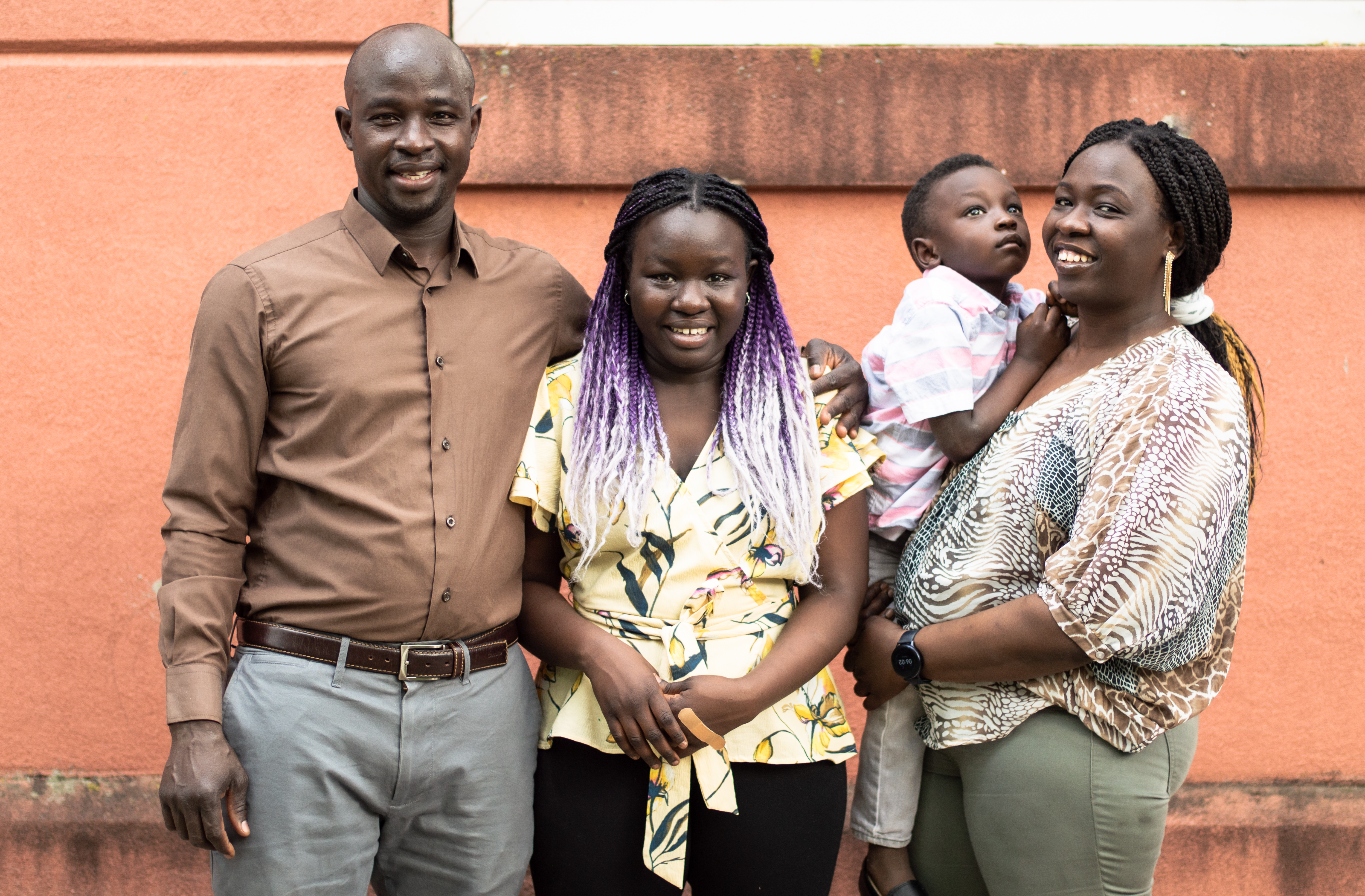
Citizen Contributions | Integrated Refugee & Immigrant Services (IRIS) | Politics | Refugees | citizen contribution
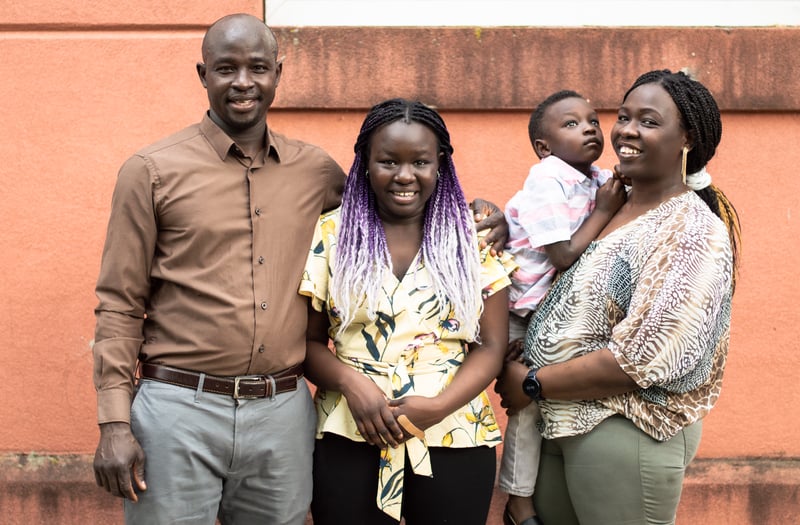
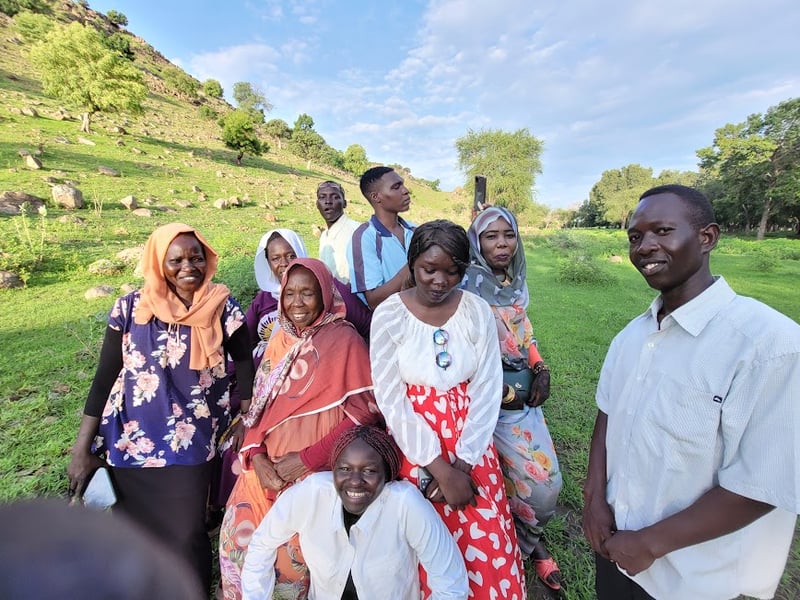
Top: Community Leaders Azhar Ahmed and Fouad Dagoum, with their daughter Lameese and son Kutti outside IRIS. Rachel Peet Photo. Below: Fouad and Azhar Ahmed, their children Kutti and Lameese, and other family in Sudan summer 2022. Contributed photo.
After a work meeting, I text my colleague Madeleine and our friend, Azhar Ahmed, my best New Year’s resolution yet: Tag along to as many Sudanese parties as possible.
Azhar is a Sanctuary Kitchen Operations Manager and an interpreter at Integrated Refugee and Immigrant Services (IRIS). She has a gift for nurturing community among people from all walks of life.
Azhar is always inviting us. Fourth of July in her backyard. A Thanksgiving welcome party for refugee newcomers. A South Sudanese New Year’s Eve feast and dance party that lit up the dead of winter like a meteor shower.
Imagine kids in light-up shoes trying to fly silver helium balloons like kites. They can’t wait to watch them float up. But they don’t want to let go. Their parents part like the Red Sea to let the eldest grandmother wheel herself to a front-row seat, as everyone counts down to midnight.
I like to believe that kid magic and adult wonder and communities of care will overcome the troubles we see. But sometimes the violence stuns me dim inside.
The war that’s destroying Sudan rarely makes headlines these days. Azhar and other Sudanese-Americans are getting awful news through Whatsapp groups, and in perpetrator and victim eye-witness videos of teenage sons and young dads forced to fight in a war that is terrorizing their families; pregnant moms shot to death on their way to one of the few health clinics left; children hiding near a mass grave.
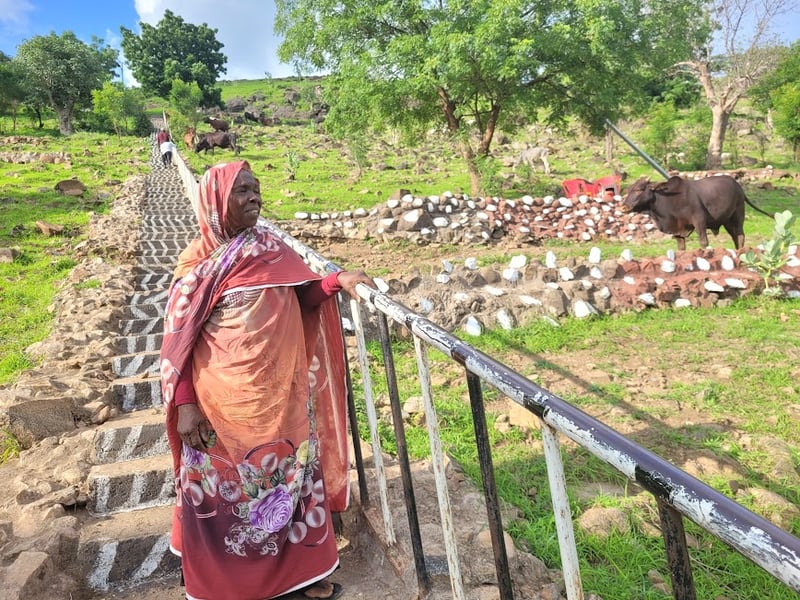
Azhar's mother, Husna, in Nuba Mountains, Sudan, summer 2022. Contributed photo.
Genocide is happening again in Darfur. Azhar and her family are scared their home region, the Nuba Mountains, is next. She has lost aunts, uncles, and cousins and the land where their grandmothers and ancestors lived.
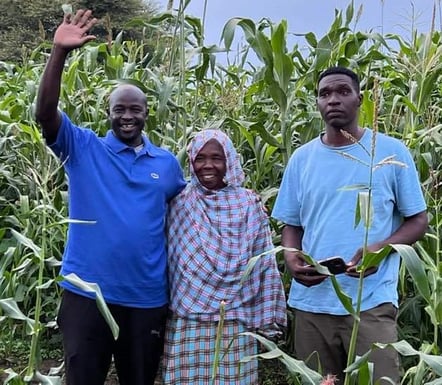 Last week, Azhar started a case with the Red Cross Reconnecting Families Program. She’s trying to find her brother Ahmed, who was captured by a ruthless paramilitary group that seized their family’s house in Khartoum. The current civil war has killed more than 10,000 people and displaced nearly 6 million, since the fighting started on April 15, 2023.
Last week, Azhar started a case with the Red Cross Reconnecting Families Program. She’s trying to find her brother Ahmed, who was captured by a ruthless paramilitary group that seized their family’s house in Khartoum. The current civil war has killed more than 10,000 people and displaced nearly 6 million, since the fighting started on April 15, 2023.
*
Fouad with Husna, and Azhar's brother Tariq.
Azhar and I talk until closing time at the Stetson Library, one Wednesday night in May. We’re near the young adult section her daughter, Lameese, likes to frequent, on breaks from SAT prep.
We’re surrounded by titles like An Ember in the Ashes; Shatter Me, Imagine Me; Each of Us a Universe. We both love arrangements of words that dart and startle us like stars. But tonight, we’re working on Azhar’s story of the beginning of the civil war that’s devastating Sudan. The house where she grew up in Khartoum, the garden her dad planted before his kidneys failed, the room where she took care of him near the end of his life, are now all occupied by fighters from the Rapid Support Forces (RSF). The RSF is one of the brutal groups that is terrorizing civilians throughout the country—a new configuration of the Janjaweed militia that has committed genocidal violence in Darfur and in Azhar’s home region.
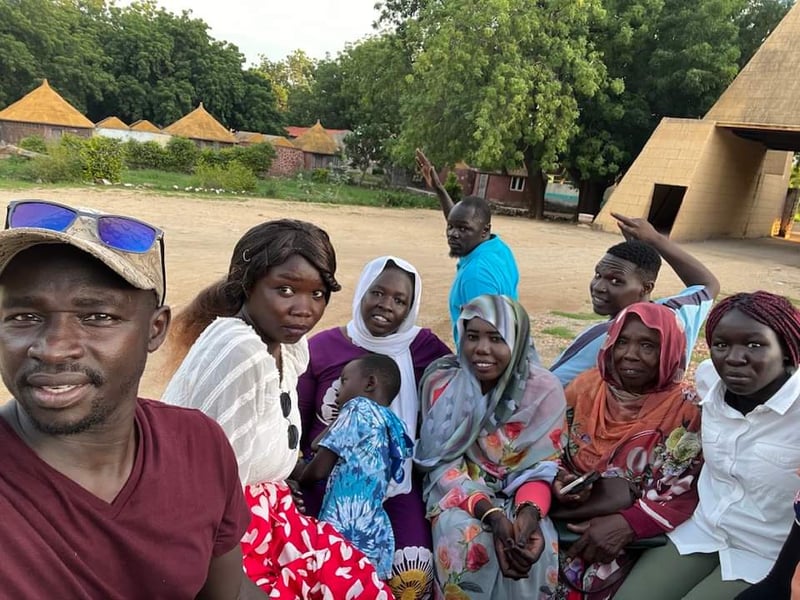
Fouad, Azhar, their children and other family in Sudan, summer 2022. Fouad Dagoum Photo.
Our friends from West Darfur lost their city Al Geneina, in two massacres, targeting the Masalit tribe. But, through photos and videos and stories they share, we get glimpses of the home they long to restore: People singing with a drum circle, near a thicket of neem trees. Elders boil the bark for medicine, the leaves for tea. One friend showed me, on his phone, lightning in an aquamarine sky, signaling a downpour that will fill the valleys, making the lakes of Al Geneina that he used to swim in as a kid. He told me how beautiful it used to be after the rainy season: “Everything is growing and green, and the mangoes fall like leaves.”
The war has turned Al Geneina into a wasteland. A survivor of the 2003 Darfur genocide told me he’s never seen anything like it. Photos show bomb craters, mass graves, and ash. People are killed in their homes, in mosques, in the streets. Six thousand people have died in West Darfur since April. Those who survived tried to walk nearly 19 miles through a war zone to cross the border into Chad. Those who made it had to weather the rainy season with no shelter. They live, without enough water or food, under the threat of the violence they fled spilling over the border.
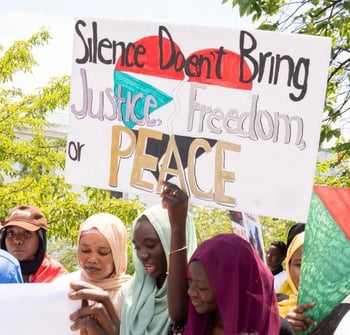 Sudanese-Americans have done at least three peace rallies in Washington, DC, urging the U.S. to take more strategic action to end the humanitarian emergency in Sudan. But they’ve gone largely ignored.
Sudanese-Americans have done at least three peace rallies in Washington, DC, urging the U.S. to take more strategic action to end the humanitarian emergency in Sudan. But they’ve gone largely ignored.
Azhar shows me a photo of her husband, Fouad, and his mom. She’s wearing sea green and orange and pink. Her quiet eyes speak through the screen of Azhar’s phone. She had to evacuate her home in the Nuba city Kadugli and stay in a makeshift shelter in a school. Fouad has not been able to reach her in two months. He keeps calling, and keeps praying she is OK.
Azhar’s parents fled the Nuba Mountains before she was born and built a new life in the capital Khartoum. When her 6-year-old son, Kutti, saw news footage of Khartoum burning, he asked “Is this our Sudan?”
When the library closes, we drive up Dixwell Avenue to the Touba Lisha salon. We wait for Azhar’s friend to finish braiding Lameese’s hair. We sink into a brown pleather couch behind the shampoo chairs, and Azhar shows me a photo from their last trip to Sudan: Grandmothers and aunts, uncles and brothers, sisters and kids gathered around a platter the size of a hula hoop. Bowls of fuul and yogurt. Mounds of bread. A kettle at their feet. Lameese and Kutti spent every minute with their cousins.
“They loved it,” Azhar tells me. “The way we gather in Sudan.”
*
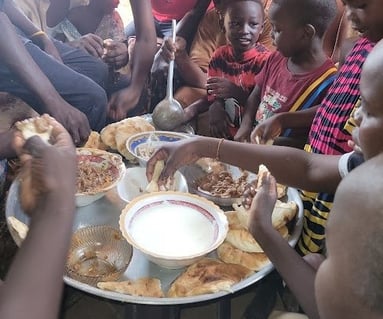 The people in the photo are scattered now. I imagine their windows and bowls are shattered. The curtains tattered and half burned. Broken furniture. Pictures and vital documents strewn on the floor. A bomb crater where the garden was.
The people in the photo are scattered now. I imagine their windows and bowls are shattered. The curtains tattered and half burned. Broken furniture. Pictures and vital documents strewn on the floor. A bomb crater where the garden was.
Three of the young cousins are stranded in another part of Khartoum, with their mom and grandmother, who lost one of her legs. Two of Azhar’s brothers had to evacuate a shelter where they’d been staying in a place called Madani, which had been a safe zone, until the RSF attacked on Dec. 15. Azhar’s mom, Husna, and other family members risked their lives to get to Cairo, Egypt, where they live in precarious limbo.
Azhar found out her brother, Ahmed, was captured in Khartoum when someone sent her a video the RSF posted on Facebook on Oct. 22, 2023. Fighters were rounding up young men, and she recognized her brother’s face. “I don’t want to look at these [videos],” she said. “But I have to.”
“I wish this was a [bad] dream, and I could wake up.”
*
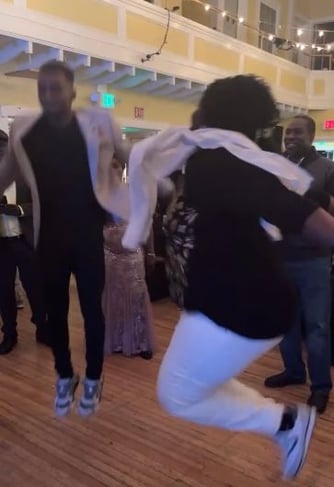 Perhaps because the terrible news keeps happening. Perhaps because of the frenetic pace of our days barely leaves space to grieve or be astonished, I wish I could relive the best New Year’s Eve party of my life.
Perhaps because the terrible news keeps happening. Perhaps because of the frenetic pace of our days barely leaves space to grieve or be astonished, I wish I could relive the best New Year’s Eve party of my life.
Imagine lights draped between ceiling corners, making a constellation over the ground floor of the Whitneyville Cultural Commons. Toddlers in silver cardboard hats. Teens in puffer jackets. Dads in dapper suits, or gallabiyas, ironed from collar to hem. Moms in elegant dresses and heels. Aunties, draped in bright toubs: green and turquoise fabric, gold beads, shades of peacock and sea. Platters of lamb and goat. Stewed greens. Chicken simmering in tomato gravy. Stacks of kisra, crepe-thin layers of bread to sop up the stew. Before we eat, a South Sudanese church leader blesses the food. And Azhar recites verses from the Qur’an.
During the last ten minutes of 2023, a woman named Apajok invites people to offer wishes for the new year. She passes the mic from table to table. I can’t remember exactly what was said. But I have a collage of phrases in my ear: “To encourage each other; to keep our hope awake; that is our assignment… We are Nuba and Dinka. We are Kakwa and Kuku. We are Masalit and Fur. We are all Sudanese, and we need peace.”
Just before midnight, Azhar revs up a playlist she compiled with songs from all the tribes.
“See what happens when you take away borders and make space for community?” my co-worker Isabella said. We’re sitting at a table with a couple from Ethiopia and Darfur, and two IRIS colleagues: Akram, our data coordinator, who got back from JFK just six hours before, after a trip to visit family in Iraq. Linda, the senior case manager, whom Fouad told, soon after the family arrived in New Haven, how they got through their years living as refugees in Egypt.
“You have to do picnics,” he said. “Otherwise you will get depressed.”
“You must be tired, after working yesterday," I said to Azhar when she comes to our table. "And cooking and decorating for the party.”
“Yes, I am tired,” she said. “But music!”
I notice her earrings, iridescent silver birds. She turns, and they catch a certain angle of light. For a moment, I see swallows flashing like stars.
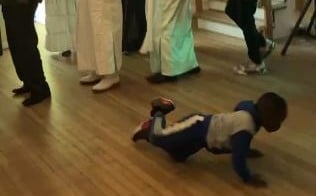 Soon after the playlist begins, a dance circle forms. People alternate moving to the middle to do a few signature moves. The Dinka hop-march. The jubilant Nuba stomp. The Masalit jump. Kids show off their break-dance moves. The circle around them keeps moving. Some people do their own thing: jazz hands and swivel hips; syncopated elbow bends; smooth slights of knee. There’s a special resonance, a particular rhythm, to all these moving parts circling the dance floor, a lithe march, so buoyant it seems we could launch into a wheeling arc, like swallows at dawn.
Soon after the playlist begins, a dance circle forms. People alternate moving to the middle to do a few signature moves. The Dinka hop-march. The jubilant Nuba stomp. The Masalit jump. Kids show off their break-dance moves. The circle around them keeps moving. Some people do their own thing: jazz hands and swivel hips; syncopated elbow bends; smooth slights of knee. There’s a special resonance, a particular rhythm, to all these moving parts circling the dance floor, a lithe march, so buoyant it seems we could launch into a wheeling arc, like swallows at dawn.
*
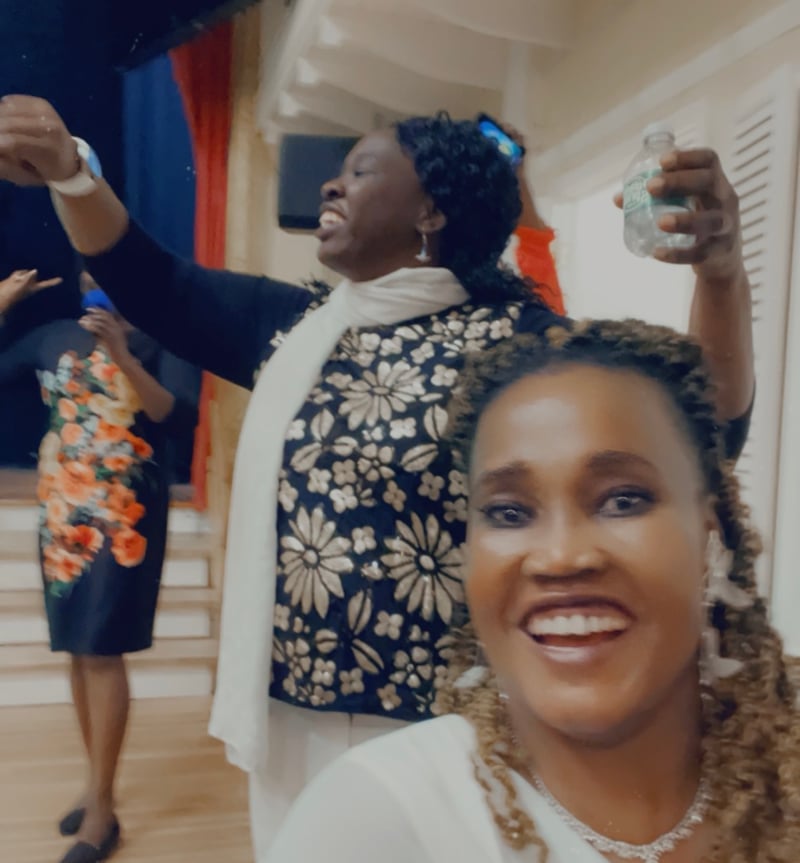
Azhar Ahmed and Suzi Mordukai on New Year's Eve at Whitneyville Commons. Suzi Mordukai Photo.
I hope we can carry that kind of magic into manic Mondays. Working with refugees and immigrants is a whirlwind mix of quick action, navigating bureaucracy and meaningful connection. Sometimes, on the margins of paperwork–reams of it, just to apply for Medicaid and SNAP food assistance, you discover the particular, difficult freight someone carries: The dad who feels uneasy eating because rations have been cut in the camp where he had to leave his parents and siblings. A single mom whose hometown was bombed, who doesn’t know if her mom is alive. A teenager grieving his grandmother, who died because she couldn’t get dialysis since the war started. You listen, with hold muzak in the background, as you wait to talk to a human at the Department of Social Services (DSS) to troubleshoot a months-long delay in getting vital assistance. Every twenty-seven minutes or so, an automated voice tells you the estimated wait time to talk to a representative.
Maybe, during that long muzaked limbo, as you scramble to work on other applications together, that single mom tells you about the songs that take her home. And how much she loves English class and can’t wait until morning to go back. Maybe she shows you a photo of her son sporting his Spiderman backpack on his first day of school. And you get to witness how she delights in her kids. And you remember joy is a survival skill. And these hours and minutes are life-giving.
*
January is a time of commemoration for South Sudan, the youngest country in the world, since gaining independence from Sudan in 2011. Jan. 9, 2024 was the anniversary of a global referendum in which 98% of South Sudanese–refugees throughout the world, and survivors within South Sudan, voted to become a sovereign nation. But independence has not brought lasting liberation. The current war in Sudan is moving closer to the border with South Sudan.
I remember talking with our friend Atem after Lake Victoria floods devastated his hometown Bor.
“How are you coping?” I asked.
He laughed.
“Sudanese people sing too much,” he replied. “We have no choice.”
It reminds me of Elie Wiesel’s questions: How can you sing? How can you not?
Ashley Makar is the community liaison for Integrated Refugees & Immigrant Services (IRIS) where she engages volunteers with refugee and immigrant newcomers in Connecticut. If you would like to contribute to Azhar’s efforts to help her family fleeing the war in Sudan and those who’ve made it to Egypt, visit her crowdfunding page

